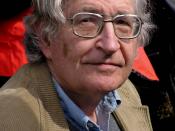Matt Ridley argues in his essay, "Genome" written in 1999, that there exists a genetic basis for language acquisition. The essay, "A Clone Is Born," written by Gina Kolata, presents numerous viewpoints on the issues of human cloning. Although both essays maintain significant and valid concerns about the use of genes, they conclude on two distinct concepts.
Kolata presents views of many experts without positioning herself in either side. She explains that the ability to clone living beings has staggering consequences. Cloning brings out questions about whether we are our genes or what makes us us. It also makes us question our ethics and beliefs. People fear the destruction of individuality and oppose the idea of playing God. Cloning is thought to be a violation of a human dignity. Through cloning, which poses danger of self-idolization and morality, the concept of self-surrender is lost. Although dignity does not have a clear definition in Kolata's essay, it still holds a foremost view on people.
A Lutheran theologian, Gilbert Meilaender, states that cloning would be "a new and decisive turn on this road." This idea explains that cloning results in the production, rather than the creation of a child. A child is known to be as a product of human will. Today, people have the freedom of using infertility and want children that can resemble to them. Yet, people are terrified of seeing their genetic replicas born again. Parents do want to create perfects kids but from this idea, raises many questions such as how far will parents go? Kolata states in her essay that since people believe in individuality it would be unethical to create a clone without any uniqueness. Another factor of reproduction is the survival of the species. If cloning were to be introduced to society as an...


